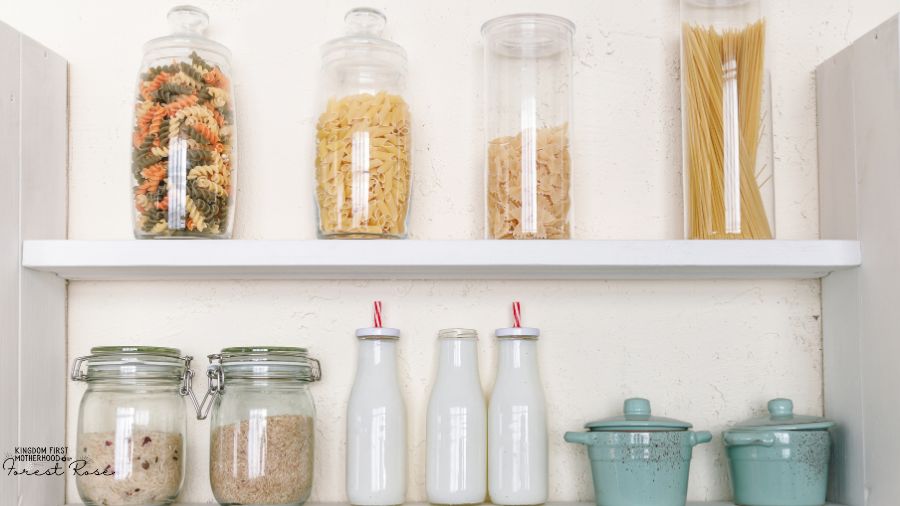If you’re like me, you try to keep your kitchen and pantry clean and organized, well as much as crazy busy mom life will allow anyway. But there’s one thing that can easily ruin all your hard work – pests! Unwanted guests can quickly become a nuisance and even a health hazard. But don’t worry, I’ve got some tips and tricks to help you keep the pests away from your kitchen and pantry for good. So grab a cup of coffee and let’s get started!

Contents
Keep the Pests Away from Your Kitchen and Pantry
Keeping pests away from your kitchen means making sure that food items are stored properly. This is the best way to avoid infestations from pests like moths, ants, roaches, beetles, or rodents – oh my.
It can be frustrating and embarrassing to discover that your home has been invaded by bugs, rodents, or some other unwelcome guests. However, with the right resources and knowledge, you can keep these pests away from your kitchen and pantry. Here are a few tips to help you keep the pests away from your kitchen and pantry.
Clean Up Your Kitchen Regularly
As moms, it’s can be tough to keep your home clean all the time. We know that our kitchen sees more activity than most rooms in your home. From hurried breakfasts and weeknight meals to hosting get-togethers, cooking in your kitchen creates a lot of crumbs and spills that need to be cleaned up daily.
While it can feel overwhelming to tackle all these messes at once, there are ways to make cleaning the kitchen more manageable. By following a cleaning schedule that divides up daily, weekly, and monthly chores into small tasks, you can ensure that your kitchen stays clean without feeling like it’s a hassle.
The most important thing is to start with the areas that need the most attention. This includes countertops, cabinets, appliances, sinks, and floors.
Use a multi-surface cleaner to minimize the amount of supplies you need when it comes time to scrub and wipe. This way, you can focus on the task at hand and get it done quickly.
Another important aspect of keeping your kitchen clean is to remove food scraps and leftovers right away after meals are made. This will help to prevent pests from taking up residence in your kitchen.
Use Natural Repellents and Deterrents
Your kitchen and pantry are among the most common areas of your home where pests can invade. The smells and easy-to-chew-through packaging in these areas make them attractive to rodents, ants, roaches and other bugs.
One of the best ways to keep these critters from getting into your food is to use natural repellents and deterrents. These include products that are made from plant-based substances, such as lemon eucalyptus oil, soy-based repellents and natural essential oils.
These repellents can be found in sprays, lotions, creams and balms as well as towelettes and wearables. Many of them contain essential oils, such as citronella, lavender, geranium, peppermint and rosemary.
Many of these repellents are safe to use on children and pets. However, you should be aware that some of them are potent or highly-concentrated and should not be used on babies or toddlers.
Animal repellents are also available on the market, but they have mixed results in dealing with nuisance animals such as raccoons, squirrels and rabbits. They usually work well as a part of other measures to keep these animals away, such as removal of their food sources and exclusion tactics.
Block Off Potential Entry Points
One of the best ways to keep your kitchen and pantry pest-free is to seal off potential entry points. These include gaps and cracks in walls, ductwork, and utility wires, as well as holes or tears in window frames.
To find these small openings, conduct a walk-through of your home and inspect every nook and cranny for potential entry points. This may require a bit of detective work, but it will pay off in the long run with less mess and a happier family.
You can also protect your food by storing it in sealed containers such as glass jars with tight-fitting lids. These are a lot more durable than their plastic counterparts and should ward off bugs and rodents for the longest time.
However, the most important point to make is that you should be aware of the fact that most pests are looking for a way in. The smallest of gaps or holes in your walls and cabinets are big enough to let the little guys in.
The best way to avoid this is to inspect your house for small gaps and crevices on a regular basis, especially during the rainy season. This will help you identify any possible entry points before they become big problems. If the problem still persists check out Corky’s Pest Control.
Install Traps and Monitor Them Regularly
If you’ve recently had to deal with an infestation in your kitchen or pantry, then this is a good time to consider installing traps to monitor the pest situation. These can be effective for many types of critters and are easy to use.
Pantry pest traps are available in a simple cardboard box, with the lure placed inside via a small circular hole at the front of the trap. Once set up, the trap should be placed inside your pantry or cupboard and a small amount of air should circulate around it to ensure it is effective.
The bait used in these traps is a time-release pheromone, which is attractive to male moths and helps interrupt the reproductive cycle of the insect. The traps are also non-toxic and can be safely disposed of as waste after use.
The traps are simple to set up and can be placed discreetly in your kitchen or pantry without being seen by anyone. They are made from thin, light-weight cardboard and have a sticky interior that attracts and captures moths.
Remove Attractants in the Kitchen
Pests are attracted to food, so removing attractants in the kitchen is important. This includes crumbs and other residue that may be left behind after meals are prepared. Cleaning these areas promptly and thoroughly can prevent pests from settling in and causing problems in the future.
Leaving open packages of food is another attractant for pests, so make sure to close them right away. If you are storing snacks that attract pests such as nuts and seeds in the pantry, it is best to use containers with airtight lids.
Garbage can also be a tempting food source for pests, so clean out your indoor trash bins regularly and keep them in sealed plastic bags. This is especially helpful if you have pets in the home who may leave their waste around the house.
It is also a good idea to monitor your expiration dates on foods in the pantry. This way, you will know when to dispose of any items that are past their prime and will help prevent pests from infesting your pantry.
Pantry pests can be a real nuisance, so it is important to take steps to keep them from destroying your pantry and the foods inside. If you notice any signs of pests in your pantry, don’t hesitate to call a professional exterminator for assistance.
Call a Professional Exterminator If Necessary
Pests are not only a nuisance to your home, but they can also carry diseases and be harmful to you and your family. Depending on where you live, they may even be dangerous to your pets or children.
If you suspect that you have a pest infestation, call a professional exterminator immediately. They will examine your home and determine the type of pests you have. They will then develop a plan for getting rid of them.
One of the first signs that you might have a pest problem is if you see bugs or rodents in your pantry. Usually, these pests have hitched a ride on dry food products or other foods that are stored in open containers.
It is important to inspect all opened packages of groceries before you place them in your kitchen pantry, especially items that are new to you. If they are chewed or damaged, toss them out.
Other signs that you might need an exterminator include ants or fruit flies in the pantry, mice squeezing through small openings and wet spots on the walls and floors. These pests are looking for moisture and water sources so be sure to patch any holes and fix any leaks in the home.
So in review, the best way to keep pests away from your kitchen and pantry is to keep it clean and organized. Make sure you store food items in airtight containers, regularly check for signs of infestation, and use natural methods such as traps, repellents or herbs to ward off the pests. Seal cracks or openings around pipes or doors to prevent them from entering your home. With a few simple steps, you can help keep your kitchen and pantry pest-free.
For more homeschooling inspiration, tips and encouragement, make sure to follow KFH on Facebook, Pinterest, Instagram and Twitter, and subscribe to our Newsletter for some FREE GOODIES!
Forest Rose is a God Loving, Blessed Wife, & Mama to 3 girls. She’s passionate about lifting moms out of the trenches that are discouraged, overwhelmed, or feeling alone or isolated. Her hope is to point them to Christ and equip them to rise up with a newfound hope and joy within, that He alone can provide. Besides blogging, she also loves to create printables!




Leave a Reply